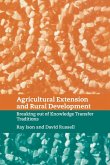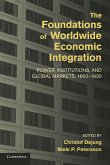Agricultural Extension Worldwide
Issues, Practices and Emerging Priorities
Herausgeber: Schram, Susan G.; Rivera, William M.
Agricultural Extension Worldwide
Issues, Practices and Emerging Priorities
Herausgeber: Schram, Susan G.; Rivera, William M.
- Broschiertes Buch
- Merkliste
- Auf die Merkliste
- Bewerten Bewerten
- Teilen
- Produkt teilen
- Produkterinnerung
- Produkterinnerung
First published in 1987, Agricultural Extension Worldwide presents an international perspective on agricultural extension and highlights extension as an integral function of agricultural development. Agricultural extension is one of the largest nonformal problem-solving educational systems in the world.
Andere Kunden interessierten sich auch für
![Agricultural Extension and Rural Development Agricultural Extension and Rural Development]() Ray Ison / David Russell (eds.)Agricultural Extension and Rural Development63,99 €
Ray Ison / David Russell (eds.)Agricultural Extension and Rural Development63,99 €![The Foundations of Worldwide Economic Integration The Foundations of Worldwide Economic Integration]() The Foundations of Worldwide Economic Integration40,99 €
The Foundations of Worldwide Economic Integration40,99 €![Marx Worldwide Marx Worldwide]() Centre for Civil SocietyMarx Worldwide41,99 €
Centre for Civil SocietyMarx Worldwide41,99 €![The Extension of the Foreign Trade Relations of the United States: a Summary of the Opinions of United States Consuls and Leading Business Men Through The Extension of the Foreign Trade Relations of the United States: a Summary of the Opinions of United States Consuls and Leading Business Men Through]() The Extension of the Foreign Trade Relations of the United States: a Summary of the Opinions of United States Consuls and Leading Business Men Through17,99 €
The Extension of the Foreign Trade Relations of the United States: a Summary of the Opinions of United States Consuls and Leading Business Men Through17,99 €![Co-operation, Trade Unionism, and University Extension Co-operation, Trade Unionism, and University Extension]() Albert MansbridgeCo-operation, Trade Unionism, and University Extension15,99 €
Albert MansbridgeCo-operation, Trade Unionism, and University Extension15,99 €![Retail Selling and Store Management [microform]: Prepared in the Extension Division of the University of Wisconsin Retail Selling and Store Management [microform]: Prepared in the Extension Division of the University of Wisconsin]() Retail Selling and Store Management [microform]: Prepared in the Extension Division of the University of Wisconsin26,99 €
Retail Selling and Store Management [microform]: Prepared in the Extension Division of the University of Wisconsin26,99 €![La Théorie De La Rente Et Son Extension Récente Dans La Science Économique: Thèse... La Théorie De La Rente Et Son Extension Récente Dans La Science Économique: Thèse...]() Paul FrézoulsLa Théorie De La Rente Et Son Extension Récente Dans La Science Économique: Thèse...26,99 €
Paul FrézoulsLa Théorie De La Rente Et Son Extension Récente Dans La Science Économique: Thèse...26,99 €-
-
-
First published in 1987, Agricultural Extension Worldwide presents an international perspective on agricultural extension and highlights extension as an integral function of agricultural development. Agricultural extension is one of the largest nonformal problem-solving educational systems in the world.
Hinweis: Dieser Artikel kann nur an eine deutsche Lieferadresse ausgeliefert werden.
Hinweis: Dieser Artikel kann nur an eine deutsche Lieferadresse ausgeliefert werden.
Produktdetails
- Produktdetails
- Verlag: Taylor & Francis Ltd
- Seitenzahl: 306
- Erscheinungstermin: 30. März 2024
- Englisch
- Abmessung: 234mm x 156mm
- Gewicht: 453g
- ISBN-13: 9781032225937
- ISBN-10: 1032225939
- Artikelnr.: 70151080
- Herstellerkennzeichnung
- Libri GmbH
- Europaallee 1
- 36244 Bad Hersfeld
- gpsr@libri.de
- Verlag: Taylor & Francis Ltd
- Seitenzahl: 306
- Erscheinungstermin: 30. März 2024
- Englisch
- Abmessung: 234mm x 156mm
- Gewicht: 453g
- ISBN-13: 9781032225937
- ISBN-10: 1032225939
- Artikelnr.: 70151080
- Herstellerkennzeichnung
- Libri GmbH
- Europaallee 1
- 36244 Bad Hersfeld
- gpsr@libri.de
William M. Rivera and Susan G. Schram
Acknowledgements Introduction I. Issues 1. The Private Sector: Its
Extension Systems and Public/Private Coordination 2. Administrative
Decentralization of Agricultural and Rural Development Programs in Asia: A
Comparative Analysis 3. The Policy Environment Necessary to Make Extension
Effective 4. An Overview of Agricultural Extension and Its Linkages with
Agricultural Research: The World Bank Experience 5. Successful Agricultural
Extension: Its Dependence upon other Aspects of Agricultural Development:
The Case of Public Sector Extension in North- east Africa 6. Making
Extension Effective: The Role of Extension/Research Linkages II. Practices
7. The Different Systems of Agricultural Extension Education with Special
Attention to Asia and Africa 8. The IARCs and their Impact on National
Research and Extension Programs 9. Training and Visit Extension: Back to
Basics 10. Making Extension Effective in Kenya: The District Focus for
Rural Development 11. The Israeli Experience in Agricultural Extension and
its Application to Developing Countries III: Emerging Priorities 12.
Designing Agricultural Extension for Women Farmers in Developing Countries
13. Incentives for Effective Agricultural Extension at the Farmer /Agency
Interface 14. India's Agricultural Extension Development and the Move
toward Top-level Management Training 15. Agricultural Manpower Development
in Africa 16. Emerging Priorities for Developing Countries in Agricultural
Extension Epilogue Index
Extension Systems and Public/Private Coordination 2. Administrative
Decentralization of Agricultural and Rural Development Programs in Asia: A
Comparative Analysis 3. The Policy Environment Necessary to Make Extension
Effective 4. An Overview of Agricultural Extension and Its Linkages with
Agricultural Research: The World Bank Experience 5. Successful Agricultural
Extension: Its Dependence upon other Aspects of Agricultural Development:
The Case of Public Sector Extension in North- east Africa 6. Making
Extension Effective: The Role of Extension/Research Linkages II. Practices
7. The Different Systems of Agricultural Extension Education with Special
Attention to Asia and Africa 8. The IARCs and their Impact on National
Research and Extension Programs 9. Training and Visit Extension: Back to
Basics 10. Making Extension Effective in Kenya: The District Focus for
Rural Development 11. The Israeli Experience in Agricultural Extension and
its Application to Developing Countries III: Emerging Priorities 12.
Designing Agricultural Extension for Women Farmers in Developing Countries
13. Incentives for Effective Agricultural Extension at the Farmer /Agency
Interface 14. India's Agricultural Extension Development and the Move
toward Top-level Management Training 15. Agricultural Manpower Development
in Africa 16. Emerging Priorities for Developing Countries in Agricultural
Extension Epilogue Index
Acknowledgements Introduction I. Issues 1. The Private Sector: Its
Extension Systems and Public/Private Coordination 2. Administrative
Decentralization of Agricultural and Rural Development Programs in Asia: A
Comparative Analysis 3. The Policy Environment Necessary to Make Extension
Effective 4. An Overview of Agricultural Extension and Its Linkages with
Agricultural Research: The World Bank Experience 5. Successful Agricultural
Extension: Its Dependence upon other Aspects of Agricultural Development:
The Case of Public Sector Extension in North- east Africa 6. Making
Extension Effective: The Role of Extension/Research Linkages II. Practices
7. The Different Systems of Agricultural Extension Education with Special
Attention to Asia and Africa 8. The IARCs and their Impact on National
Research and Extension Programs 9. Training and Visit Extension: Back to
Basics 10. Making Extension Effective in Kenya: The District Focus for
Rural Development 11. The Israeli Experience in Agricultural Extension and
its Application to Developing Countries III: Emerging Priorities 12.
Designing Agricultural Extension for Women Farmers in Developing Countries
13. Incentives for Effective Agricultural Extension at the Farmer /Agency
Interface 14. India's Agricultural Extension Development and the Move
toward Top-level Management Training 15. Agricultural Manpower Development
in Africa 16. Emerging Priorities for Developing Countries in Agricultural
Extension Epilogue Index
Extension Systems and Public/Private Coordination 2. Administrative
Decentralization of Agricultural and Rural Development Programs in Asia: A
Comparative Analysis 3. The Policy Environment Necessary to Make Extension
Effective 4. An Overview of Agricultural Extension and Its Linkages with
Agricultural Research: The World Bank Experience 5. Successful Agricultural
Extension: Its Dependence upon other Aspects of Agricultural Development:
The Case of Public Sector Extension in North- east Africa 6. Making
Extension Effective: The Role of Extension/Research Linkages II. Practices
7. The Different Systems of Agricultural Extension Education with Special
Attention to Asia and Africa 8. The IARCs and their Impact on National
Research and Extension Programs 9. Training and Visit Extension: Back to
Basics 10. Making Extension Effective in Kenya: The District Focus for
Rural Development 11. The Israeli Experience in Agricultural Extension and
its Application to Developing Countries III: Emerging Priorities 12.
Designing Agricultural Extension for Women Farmers in Developing Countries
13. Incentives for Effective Agricultural Extension at the Farmer /Agency
Interface 14. India's Agricultural Extension Development and the Move
toward Top-level Management Training 15. Agricultural Manpower Development
in Africa 16. Emerging Priorities for Developing Countries in Agricultural
Extension Epilogue Index







![Retail Selling and Store Management [microform]: Prepared in the Extension Division of the University of Wisconsin Retail Selling and Store Management [microform]: Prepared in the Extension Division of the University of Wisconsin](https://bilder.buecher.de/produkte/66/66123/66123465m.jpg)
